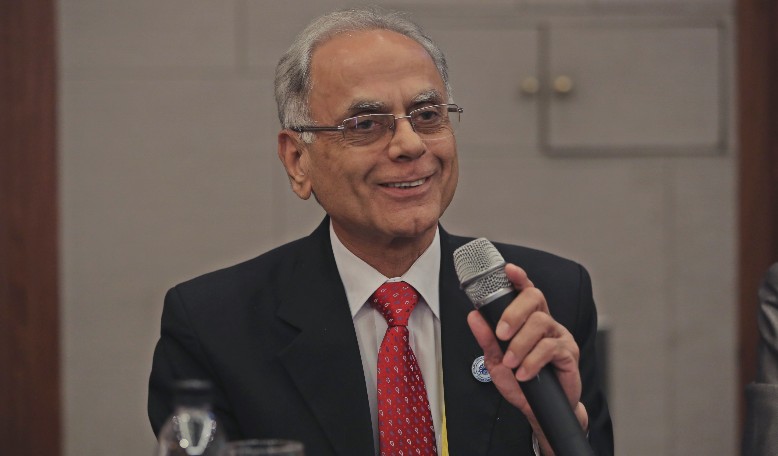President of ECOSF discussed present-day significance of science communication


During the Health Communication STEP held on November 26, president of ECOSF delineated the significance of science communication in our age.
MSTF Media reports:
The Science and Technology Exchange Program (STEP) held on November 26 as a virtual panel discussion on “National Policy and Institutional Framework for Health Communication,” was jointly organized by ECO Science Foundation (ECOSF) and the Mustafa Science and Technology Foundation (MSTF).
This virtual event featured prominent science communicators from Pakistan, Malaysia, Iran, and Egypt.
Manzoor Hussain Soomro, President of ECOSF from Pakistan, delivered a speech on “bridging science and society through science communication” at the opening of the event.
Highlighting the gaps that exist between science and the society, Soomro said that nowadays we witness “spectacular developments in science and technology, unparalleled economic growth, and innovations, but there are also uncontrolled exploitations of earth’s resources.”
He called the 21st century “the century of knowledge.”
The technological breakthroughs in the 20th century made unprecedented advancement in “human development, industrial growth and eradication of poverty.” According to Soomro, this needs to be “recalibrated” in the 21st century.
In this day and age, there is a “disconnection” between science and society mainly because “progress in science has been mostly insular and monolithic.”
He also pointed to the fact that there has been “a relentless pace of technology.”
The information generated over the past 30 years, is more than the information generated in the previous 5000 years, Soomro noted.
“Scientific revolution has outpaced social revolution for over a century now,” he added.
As a consequence of the mentioned “disconnection,” the critical issues of the world such as environmental issues, health problems, extinction, unsustainable consumption, and most importantly “the growing inequalities and the knowledge divide have not come into sharper focus soon enough,” Soomro continued.
According to Soomro, the paradox of our time is that despite spectacular advances in science and technology, unprecedented economic progress, and improvements in the quality of life, “the growing inequalities are still there.”
The knowledge divide, on the one hand, is because of the inequalities. On the other hand, inadequate knowledge brings about inequalities. This cycle leads to having a troubled world, he said.
He also brought up the issue of “galloping consumption,” stating that it results in the “depletion of resources” and subsequently “a stressed planet.”
Overconsumption precipitates unsustainability, he added.
In societies, struggling with poverty and having inadequate education lead to not only strife and conflict, but also “violence,” he emphasized.
He stated that in the 21st century we need “a more inclusive view of science.”
Nowadays, “the assumption that science is autonomous is considered unsustainable,” he added.
As Soomro suggested, a novel role for science and technology should be considered. Science and technology need to have not only policy linkage, but also societal engagement; that is how sustainable development can come true.
“Synergy between scientific and societal progress is a must,” he remarked.
Emphasizing that “cohabitation” is required to exist between science and society, he stated that science helps the society, and society also has to accept science.
Hence, science must be “responsible,” while the society must “shed its cynicism about science” and recognize its pivotal role in improving the human life.
“The focus of science nowadays needs to be beyond discovery—addressing human needs and concerns,” Soomro highlighted.
There are “great opportunities” that can be utilized to reach the aforementioned goal, he said.
According to Soomro, the scientists must be concerned about the United Nation’s Sustainable Development Goals such as “hunger, health, education, and environment.”
Moreover, there can be linkages to Global Change Research Programs such as climate change, energy nexus issues, etc.
He stated that fundamental aims, including “centrality of social engagement, policy interventions, and international partnerships” are needed to be pursued in societies.
In Soomro’s words, we need to “educate rather than policing” people, and for that, there is a strong need for not only “a scientifically-informed political leadership,” but also “a politically-savvy scientific leadership.”
He said the four main takeaways for pursuing scientific literacy in the population are “practical argument, civic argument, cultural argument, and economic argument.”
Underscoring the vital importance of science communication during the pandemic, he brought up the issue that many considered COVID-19 as cold or the flue. This false assumption was adopted not only by some ordinary people, but also by some of the politicians and officials.
This virtual STEP was attended by 50 participants from 13 countries: Uganda, Bangladesh, Iran, Pakistan, India, Malaysia, Azerbaijan, Canada, Oman, the Philippines, Algeria, Lebanon, and Belgium.